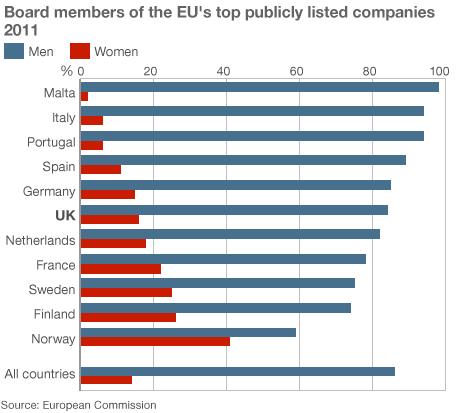Women hold fewer than third of top jobs - BBC research
- Published
Cherie Blair believes more needs to be done to help women get to the top
Fewer than a third of the UK's most influential jobs are held by women, figures compiled by BBC News show.
Women occupy on average 30.9% of the most senior positions across 11 key sectors analysed by the BBC, including business, politics and policing.
The armed forces and judiciary have the fewest women in top posts - 1.3% and 13.2% respectively - while secondary education has the most (36.7%).
Campaign group the Fawcett Society said progress was still too slow.
"Men outnumber women by four to one in Parliament and only a third of local councillors are women," the group's Preethi Sundaram said.
"When we look at the top quarters of power in the political world there are only five women there out of 22… It's quite an appalling fact really."
According to the BBC News website's findings, women represent
1.3% of brigadiers (or their equivalent) and above across the Army, Navy and RAF
13.2% of the most senior judges (High Court and above, including Senators of the College of Justice in Scotland)
14.2% of university vice-chancellors
16.6% of the most senior staff in the police (Acpo ranks and above)
34.7% of the senior civil service
Women are most strongly represented in secondary education, where they make up 36.7% of head teachers, and in public appointments, where they account for 36.4%, the analysis found. A <link> <caption>public appointment</caption> <url href="http://www.direct.gov.uk/en/Governmentcitizensandrights/UKgovernment/UKpublicappointments/DG_067071" platform="highweb"/> </link> is an appointment to the board of a public body or government committee.
The Home Office told the BBC it aimed to have more than half of new public appointments filled by women by 2015.
The European Commission is considering new laws to get more women into the top management jobs. Currently, just one in seven board members at Europe's top firms are women.
'Burdensome regulation'
A <link> <caption>public consultation </caption> <url href="http://ec.europa.eu/justice/newsroom/gender-equality/opinion/120528_en.htm" platform="highweb"/> </link> to generate initiatives aimed at redressing the gender imbalance - including mandatory quotas - ended on Monday.
EU Justice Commissioner Viviane Reding told the BBC it was "crystal clear" the issue needed to be addressed.

The Commission will decide in the autumn what kind of measures are needed to make "real progress", she said.
The UK government <link> <caption>has told FTSE 100 companies to have a minimum of 25% of female directors</caption> <url href="http://www.bis.gov.uk/assets/biscore/business-law/docs/w/11-745-women-on-boards.pdf" platform="highweb"/> </link> by 2015.
Women hold 16% of directorships at the UK's 100 largest-listed companies. Ten years ago just 7.2% of board members were female.
The government wrote to the Commission on Monday stating it did not support EU action on the issue.
It cited evidence that gender diversity was improving without the need to resort to "burdensome regulation".
Research by Cranfield School of Management now predicts 36.9% of directors could be women by 2020, exceeding the 25% target.
But Ms Reding said that, at the current rate of change, it would take more than 70 years to reach gender-balanced boardrooms in the UK.
"This puts the UK firmly in the same boat as the rest of Europe - progress is being made but it is still far too slow," she told the BBC.
Jane Scott, UK director of the Professional Boards Forum, said quotas would be "very unpopular" in the UK.
But barrister Cherie Blair backed the measure.
"The truth is that we have waited and waited and unless we do take special measures to look at the systemic reasons why women aren't making it to the top, we are never going to succeed," she told the BBC.
In the coalition government, women hold five of the 22 positions in the Cabinet (21.7%).
David Cameron pledged before he won power that a third of ministers in his government would be women by the end of this first term.
Urgent action
Of 121 government ministers, including the cabinet, whips, lords and 13 unpaid positions, 17% are women.
Preethi Sundaram said the lack of women in the top jobs in politics undermined the legitimacy of decisions being made.

Sarah West is the first woman to command a major warship
Unless urgent action was taken, she warned, women's representation in Parliament could stay the same or decrease by 2015.
"The lack of women at the top table in politics sends a clear signal to other walks of life that excluding women is acceptable," she said.
Kate Green MP, Labour's Shadow Women and Equalities Minister, said Labour now had more female MPs than the other parties in Parliament combined.
"But we still have a long way to go to ensure that women are better represented, not only at every level in politics, but at every level in society too," she said.
The Home Office said it was working with all political parties to ensure more women seek election.
The Ministry of Defence said women were "fundamental to the operational effectiveness" of the armed forces, "bringing talent and skills across the board".
Commander Sarah West last week became the first woman to command a major warship, HMS Portland.
'Best candidates'
A spokeswoman said the "vast majority" of roles were open to women.
"The armed forces continually review their policies to ensure that they attract the best female candidates and remain competitive with other employers," the spokeswoman said.
Peers in the House of Lords debated legislation to encourage more women to become judges on Monday.
The <link> <caption>Crime and Courts Bill</caption> <url href="http://services.parliament.uk/bills/2012-13/crimeandcourts.html" platform="highweb"/> </link> aims to modernise the process of judicial appointments, looking at, for example, a greater emphasis on part-time working.
In future, if two candidates of equal merit come forward, a choice could made on the basis of improving diversity.
Rabbi Julia Neuberger, chairwoman of the Advisory Panel on Judicial Diversity, told the BBC that some judges did not like the plans, but it was about being "flexible and creative".

- Published8 March 2012
- Published21 February 2011
- Published9 February 2012